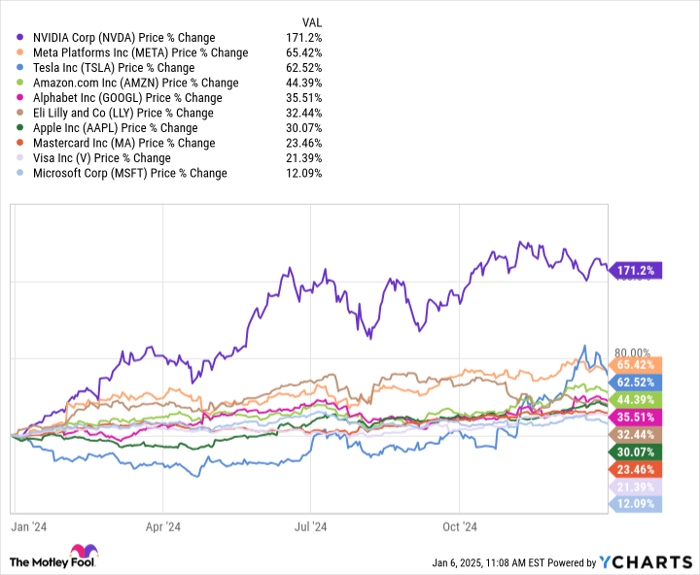1 Vanguard Etf To Confidently Buy With $430 During The S&p 500 Bull Market In 2025

The S&P 500 is coming off back-to-back annual gains of more than 25% in 2023 and 2024 (including dividends), something it has only done one other time in its history dating back to 1957. In other words, the bull market is roaring.
The S&P 500 is weighted by market capitalization, so the largest companies in the index have a greater influence over its performance than the smallest. A lot of its recent strength is coming from its biggest constituents -- especially those in the technology sector, which operate at the forefront of trends like artificial intelligence (AI).
Start Your Mornings Smarter! Wake up with Breakfast news in your inbox every market day. Sign Up For Free »
The Vanguard Growth ETF (NYSEMKT: VUG) is an exchange-traded fund (ETF) that exclusively invests in those large and megacap stocks. It has outperformed the S&P 500 since it was established in 2004, and I think that trend will continue.
Here's why investors with a spare $430 (money they don't need for immediate expenses) should consider using it to buy one share of this ETF in 2025 and holding it for the long run.
Tech stocks dominate this Vanguard ETF
The Vanguard Growth ETF holds 182 stocks from 12 different sectors. Since it primarily invests in America's largest companies, it's no surprise the technology sector accounts for a whopping 56.8% of the total value of its portfolio.
Apple, Nvidia, and Microsoft are the only three companies in the world with market capitalizations of $3 trillion or more, and each of them is in the tech sector. Those three names alone make up a combined 32.7% of the Vanguard ETF:
|
Stock |
Vanguard ETF Portfolio Weighting |
|---|---|
|
1. Apple |
11.52% |
|
2. Nvidia |
10.68% |
|
3. Microsoft |
10.54% |
Data source: Vanguard. Portfolio weightings are accurate as of Nov. 30, 2024, and are subject to change.
The top 10 holdings in the Vanguard ETF -- many of which are considered leaders in various segments of the AI boom -- delivered an average return of 49.8% in 2024. Therefore, it's no surprise the ETF was up 32.6% overall last year, crushing the S&P 500 by an even wider margin than it normally does (more on that later):
Nvidia is the most important company in the AI space right now, because its graphics processors (GPUs) for the data center are the best in the world for developing the technology. Demand far exceeds supply for its new Blackwell AI chips, which is a key reason I think its stock will soar again during 2025.
Apple and Microsoft are also important pieces of the puzzle. With more than 2.2 billion active devices worldwide, Apple could become the biggest distributor of AI to consumers via its Apple Intelligence software, which is now active in the latest iPhones, iPads, and Mac computers. Microsoft's Azure cloud platform, on the other hand, is a go-to destination for business and developers seeking the tools they need to build AI software, including computing capacity and ready-made large language models (LLMs).
Amazon's cloud division is also becoming a leader in AI infrastructure and services. Then there is Meta Platforms, the developer of the world's most popular open-source LLM called Llama, which has been downloaded more than 600 million times.
This spectacular portfolio of stocks comes at a very low cost. The Vanguard ETF has an expense ratio of just 0.04%, which is the proportion of the fund deducted each year to cover management costs. Vanguard says the average expense ratio of comparable funds in the industry is substantially higher at 0.95%, which can detract from investors' returns in the long run.

Image source: Getty Images.
Beating the S&P 500 again in 2025 (and beyond)
The Vanguard ETF has delivered a compound annual return of 11.7% since it was established in 2004, beating the average annual gain of 10.4% in the S&P 500.
Its return accelerated to 18.3% per year over the last five years, as America's tech giants grew more dominant than ever. That compares to an average yearly return of 15.2% in the S&P over the same period.
In other words, the Vanguard ETF seems to be extending its performance gap compared to the S&P over time. Can that trend continue? It might depend on the success of AI.
Nvidia CEO Jensen Huang believes tech giants will spend up to $1 trillion over the next four years on upgrading their infrastructure to meet demand from AI developers. That will benefit his company, in addition to others like Broadcom and Advanced Micro Devices, which are also in the Vanguard ETF.
Global consulting firm PwC thinks AI will add $15.7 trillion to the global economy overall by 2030, which will require a contribution from not only hardware companies, but also cloud and software companies like Microsoft, Amazon, and Meta.
On the other hand, all of the companies I just mentioned could lose value if AI fails to live up to expectations, which would likely trigger a period of poor performance in the Vanguard ETF given their enormous weightings. Investors can mitigate that risk by owning the ETF as part of a diversified portfolio of other funds or individual stocks, and I think that's the way to go.
Don’t miss this second chance at a potentially lucrative opportunity
Ever feel like you missed the boat in buying the most successful stocks? Then you’ll want to hear this.
On rare occasions, our expert team of analysts issues a “Double Down” stock recommendation for companies that they think are about to pop. If you’re worried you’ve already missed your chance to invest, now is the best time to buy before it’s too late. And the numbers speak for themselves:
- Nvidia: if you invested $1,000 when we doubled down in 2009, you’d have $363,385!*
- Apple: if you invested $1,000 when we doubled down in 2008, you’d have $45,870!*
- Netflix: if you invested $1,000 when we doubled down in 2004, you’d have $474,140!*
Right now, we’re issuing “Double Down” alerts for three incredible companies, and there may not be another chance like this anytime soon.
*Stock Advisor returns as of January 6, 2025
John Mackey, former CEO of Whole Foods Market, an Amazon subsidiary, is a member of The Motley Fool's board of directors. Randi Zuckerberg, a former director of market development and spokeswoman for Facebook and sister to Meta Platforms CEO Mark Zuckerberg, is a member of The Motley Fool's board of directors. Suzanne Frey, an executive at Alphabet, is a member of The Motley Fool's board of directors. Anthony Di Pizio has no position in any of the stocks mentioned. The Motley Fool has positions in and recommends Advanced Micro Devices, Alphabet, Amazon, Apple, Mastercard, Meta Platforms, Microsoft, Nvidia, Tesla, Vanguard Index Funds-Vanguard Growth ETF, and Visa. The Motley Fool recommends Broadcom and recommends the following options: long January 2025 $370 calls on Mastercard, long January 2026 $395 calls on Microsoft, short January 2025 $380 calls on Mastercard, and short January 2026 $405 calls on Microsoft. The Motley Fool has a disclosure policy.


